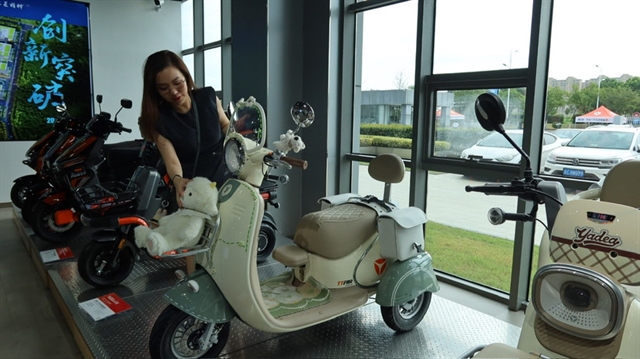 Society
Society

 |
| With their sleek, user-friendly designs, electric motorbikes are becoming increasingly popular among young consumers. VNA/VNS Photo |
HÀ NỘI — An increasing number of Vietnamese, particularly young people and urban residents, are switching from gasoline-powered motorbikes to electric ones, a more eco-friendly, cost-efficient choice that suits daily commuting needs.
According to recently published statistics from MotorCycles Data, total two-wheeler sales in Việt Nam reached 1.6 million units in the first half of 2025, up 19 per cent year-on-year.
Electric motorbikes were the fastest-growing segment. VinFast’s sales soared 501 per cent, consolidating its position as the market leader. Chinese manufacturer Yadea followed with 37.5 per cent growth, trailed by Dibao, Pega and other brands.
The appeal lies in consumers' growing environmental awareness and the clear economic benefits of electric vehicles.
“Since switching to an electric motorbike, I’ve saved nearly VNĐ1 million (US$37.86) a month on fuel, not to mention the much lower maintenance costs. The ride is quiet, smooth and perfect for city travel,” said Nguyễn Gia Bách, 32, an office worker in HCM City.
Sharing a similar view, 40-year-old Lê Thành Long in Hà Nội said that instead of spending VNĐ1.5 million ($56.80) per month on petrol, he now pays just VNĐ150,000 to charge his bike at his apartment complex.
“My friends and I have all switched to electric motorbikes. These days, there are so many choices with modern designs, youthful styling and advanced tech features,” he added.
A survey conducted by Nguyễn Hoài Nam, lecturer at the Faculty of Industrial and Energy Management under the Electric Power University, and published on diendandoanhnghiep.vn polled 198 consumers nationwide. They found that the decision to purchase an electric vehicle in Việt Nam has been shaped by six main factors: economic considerations, infrastructure and convenience, technology and features, conversion readiness, social and environmental awareness, and policy and brand reputation.
One of the survey’s most positive findings is that trust in electric vehicle technology is improving. Many respondents, particularly those in their 20s and 30s, reported a solid understanding of how electric motorbikes work and expressed interest in their integrated tech features.
Modern design, stylish appearances and diverse model options are also major draws, with aesthetics now playing a decisive role in purchase decisions, especially in large cities, where expressing individuality through one’s vehicle is increasingly common.
Beyond technology, community influence has emerged as another strong driver. Many respondents admitted they were swayed by the opinions of family members, friends or colleagues who already own electric bikes.
At the same time, rising awareness of environmental benefits, such as lower greenhouse gas emissions and reduced noise pollution, is encouraging more responsible consumer behaviour. For people with higher education and above-average incomes, these environmental considerations are often a decisive reason to switch to electric.
However, young buyers also expressed anxiety about battery safety, following recent reports of fires and explosions involving electric motorbike batteries.
Lê Thị Hồng Thắm, 35, in HCM City said: “I like electric bikes because they’re safer for my child and better for the environment, but I worry about recent news of battery fires. If I buy one, I will carefully research which brands use safe battery technology and hold proper safety certifications.”
Her concerns are valid. Battery and charging safety remain among the biggest barriers for many potential buyers.
A battery technology expert at HCM City University of Technology explained that most fires resulted from poor-quality batteries, outdated battery management systems or improper charging.
“Consumers should choose brands that invest heavily in R&D, operate certified production facilities, maintain transparent quality control and most importantly, use batteries with internationally recognised safety certifications,” he said.
He added that choosing an electric motorbike was no longer just about style or price. It was about the manufacturer’s reputation, technological standards and commitment to safety.
Nguyễn Ngọc Bảo, a National Assembly deputy of the 13th legislature and former permanent member of the National Assembly’s Economic Committee, noted that the idea of banning polluting two-wheeled vehicles in major cities was first raised nearly 20 years ago.
“At the time, there were many reasons why such a policy could not be implemented, from low economic capacity to an underdeveloped power grid,” he said. “Back then, Việt Nam’s GDP per capita was only around US$500–700, whereas it is now close to US$5,000.”
He stressed that today’s economic context was entirely different. Moreover, as Việt Nam integrates globally, it must honour its commitments to reduce emissions.
“Those commitments must be fulfilled. The electrification of transportation is therefore a necessary step. There is no alternative,” he said.
“The ultimate goal of any policy is to serve people. If an electric motorbike does not meet market demand, no one will want to buy it. Price, quality and design are the three key factors that ultimately determine consumer spending,” Bảo added. — VNS




.jpg)